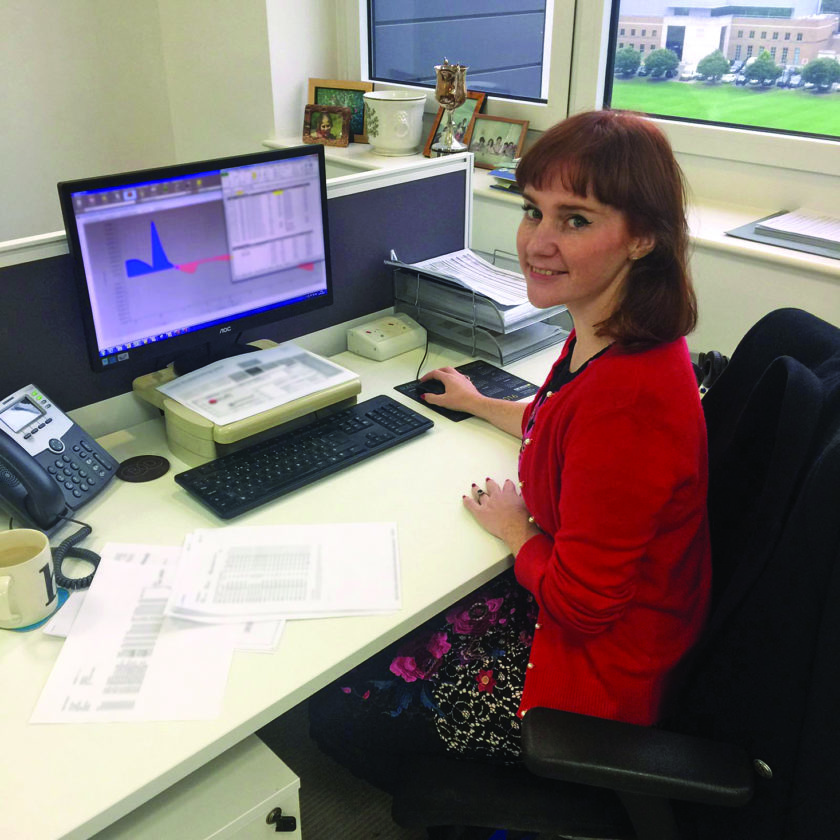Worth her weight in gold
CISI Paraplanner of the Year Jenny Ryan tells us how she set her sights on becoming a paraplanner and why her award celebrations were low key
Only one thing might have detracted from the achievement of Jenny Ryan, paraplanner with Baigrie Davies, of winning the CISI Paraplanner of the Year 2016 award and that was not being at the ceremony at the Celtic Manor Hotel to receive her award.
“I had an AF paper the next day in London which meant that I couldn’t be there,” she explains. Instead, Baigrie Davies MD Ian S. Howe went up on stage to accept it on her behalf.
Winning the award is an outstanding achievement given that although Jenny has been in financial services since 2010, she has only been in a full-time paraplanning role for two years.
For the paper she submitted on the theme of the value of a paraplanner, she equated the worth of a paraplanner to “her weight in gold” ($2,416,149.91 at the time) mixing an entertaining approach to the subject while also putting across serious points on the importance of paraplanners to financial planning firms. This and the testimonial from her financial planner, clearly resonated with the judges who called her in for the second stage interview.
“It was the first time I had applied for the award so while I liked to think I had a chance at winning… I didn’t know if I could,” she says. That may have helped her she says, as she went into the interview feeling quite relaxed about it and came out feeling she had had a good discussion with the judges. They evidently thought so too.
Jenny came across paraplanning while working for investment companies. A love of art, nurtured by her artist mother, had seen her take a degree in the History of Art, “because I wanted to do something academic rather than on the practical side.” After three years studying, although the natural path for those on her course would have been a Masters degree, she decided she wanted to go out to work. An agency placed her with investment firm Ingenious in an administrative role, where she showed her talent and ambition by eventually running the client services team.
She then moved to Future Capital Partners, working in the EIS, VCT and structured products space, as a business development associate. It was here that she began working with financial planners and advisers, who were her clients. Financial planning piqued her interest. “The more I learned about what financial planners did, the more I felt financial planning was the area I wanted to get into,” she says.
“So I looked in to what it would take to get a job. I did my first CII paper when I was at Future Capital and I started looking around for a job.”
She quickly honed in on paraplanning as a role that she felt would suit her skills and her interests but, she says, “I was told by recruitment agencies that you can’t just walk into a paraplanner job, you have to work your way into the role.”
So in 2014 she started as an administrator for financial planning firm, Connor Broadley, with a view to progressing into paraplanning. Connor Broadley was a relatively new firm having set up in 2007, in Mayfair, targeting private and corporate clients.
Jenny started with basic administrative tasks including managing advisers diaries, and pursuing information requests – “sitting on hold to providers for hours on end”.
At the time, the firm had a large auto enrolment project under way, in which Jenny became involved. “I worked with corporate clients helping them stage, which meant I had a lot of client contact and after a while I was going out to see clients on my own.”
However, with her sights firmly set on paraplanning, she began also to start writing reports for clients.
“I’d said when I went for the job that I wanted to be a paraplanner and the role was the start of a career path. Connor Broadley were fine with that as they were very keen on taking people on at a junior level and training them into more senior roles.
“So I started taking on more report writing duties, attending a few client meetings, and gradually I moved from administrator into a more defined paraplanning role.”
There was no real cut off point between one job and the other probably, she adds, until the firm hired a new person to take on her admin duties. “Even then I was training my replacement on the job, so there was still an overlap.”
After that point, Jenny says she was able to devote herself fully to paraplanning.
“It really enjoyed it, although I would have liked to have had more client contact and because it was a very busy office, the paraplanning work was more transactional than I would have liked,” she says.
“But what was good about the job was that, as well as being a good learning ground because it was such a busy office and covering both private and corporate clients, the advisers were very particular about how reports should be written. They insisted things were done to a very high standard and that got me into good habits.”
Unfortunately, in September 2015 Jenny was given the bad news that she was being made redundant. The good news was that by that time demand for paraplanners was growing exponentially andBaigrie Davies quickly snapped her up.
Current role
Moving jobs has increased Jenny’s scope and responsibilities and that suits her very well, she says.
“I have a lot more involvement and client contact than I did in my previous role. That client contact helps me as a paraplanner. It is also the part of the job that is the most interesting, because it’s about the people and how the financial plan fits into their lives. So as a paraplanner I get to see the bigger picture for the client, which means I can have more input into the advice.
“Richard and I will talk about the advice before we put it into the report and we will discuss and challenge each other on items, which I think makes for a better report and outcome for the client.”
Cashflow planning is now a large part of her work and again, she says, that suits her well.
“Cashflow wasn’t something I had used before I joinedBaigrie Davies (which uses Prestwood’s Truth software), so I had to learn it from scratch,” she says.
“But I love cashflow. It’s pretty much the basis of everything we recommend and advise clients to do. Looking at how much we use it and how useful it is when explaining things to clients, it is difficult to see how financial planners can get by without it.”
She adds: “Of course it can only ever be a projection and things are rarely going to turn out exactly the way the cashflow looks, particularly when you’re projecting years into the future. There are so many unexpected things that can happen in the interim, but it forms an important basis, an anchor if you like, around which you form everything else.”
The downsides to using cashflow modelling, such as they are, she adds, are that inputting a new client “can take ages,” and while updating the record is easier, “you have to be careful to think through the changes you are making, because you can make one change which will have a knock on effect with several others in the background.
“But I would find it very hard to stop using cashflow now.”
Alongside gaining experience, Jenny has built on her qualifications over the years and currently holds level 4 Diploma and is aiming for Chartered. “I’ve just taken two AF papers, the results of which I will know in December. If I’ve passed them then I need around 30 more points to get to Chartered.”
With a background in EIS, VCTS and structured products, she says will often be asked questions by colleagues, “because they are not as commonly used as other investments, so that knowledge is useful. Although I wouldn’t want to specialise in them.”
However, one area she finds particularly interesting and is pensions, since the introduction of the pensions freedoms. “It’s an area where there is a lot to learn and consider when putting together a financial plan. To date we haven’t dealt with many DB transfers. We look at it as part of our holistic advice but often the benefits are so good that we wouldn’t recommend a transfer,” she says
Biggest challenge
Asked about her biggest day-to-day challenge as a paraplanner, Jenny pauses for a moment and says: “I’d have to say time management, particularly in a busy office like ours. I think it’s important to be able to make time to think outside the box, rather than just keeping up with the flow of everyday work.
“Recently, I wanted to make changes to some of the templates we use. I wanted to look at it from the perspective of the client, make changes and do a test run with the revised template. I had to find time where I could focus on doing that. But I think it’s important to do so or nothing changes.”
Having set her sights on being a paraplanner, has paraplanning met her expectations?
“Yes; particularly in my current role. What’s good about the job is the clients. Feeling like people trust you to tell you often quite personal things and then you can go away do the work and have a direct and positive impact on their lives.
“I also find the products and research interesting but it is the impact of the advice and the human aspect that makes the job most interesting and enjoyable.”
Does that means she would stay a paraplanner or would she consider being a financial planner? “I can see why people are career paraplanners but I think I would like to try being a financial planner at some point. Although not necessarily for the long term. From attending paraplanning events I’ve met people who have gone from paraplanning into advising and back to paraplanning again. I found that interesting. I’m keen to get CF30 sign off at some point but I don’t have timeline on it.”
The final question for Jenny, as she wasn’t at the CISI awards ceremony, is whether she has found the time to celebrate her win since then?
“As I wasn’t at the awards, the CISI held on to the trophy until I could pick it up. Without the actual award to show people my celebrations have been low key. I have just picked up the physical trophy so now I feel I can go out and celebrate with my friends.”
What is a typical day for Jenny
On a typical day, Richard, my financial planner, and I will have a client meeting first thing. Richard will prepare the agenda. Normally, I will prepare a pre-meeting report and then we will sit down together and go through the agenda and any areas of the meeting that I will lead. More often than not that will be talking about the cashflow projection with the client.
We are based in The City of London, and a large proportion of our client base is people in their 40s to 60s, married professionals with families.
Mostly, clients will come to our office and I will attend most of the meetings, which tend to last an hour-and-a-half or more.
Where we are carrying out a factfind, we like to do that almost informally, more as a chat with the client, where we will prompt them to open up with questions. That way we can get the information we need in a more relaxed way for the client.
After the meeting Richard and I will talk through what happened in the meeting, what went well or what didn’t go well, as well as anything that came up that was unexpected and what we need to do as a result.
Then I will write up the factfind and put everything on the file that needs to be there. I will write a meeting note and send that in a letter to the client, confirming what we talked about, what needs to be followed up on and any further information that is needed from them.
At present I have four reports waiting to done and six cashflow profiles that I need to update before upcoming client meetings.
For review meetings, we will send out a pre-meeting prompter, asking the client to provide us with an update of any changes, such as job moves, pay rises, changes in spending, etc.
I will use that information to update their cashflow profile and then add in any scenarios that we have discussed with them in previous meetings, such as downsizing, or buying another property or retiring.
Over the course of the year I would say I average three to four reports a week. But, unfortunately, it’s not that steady a workflow!






























